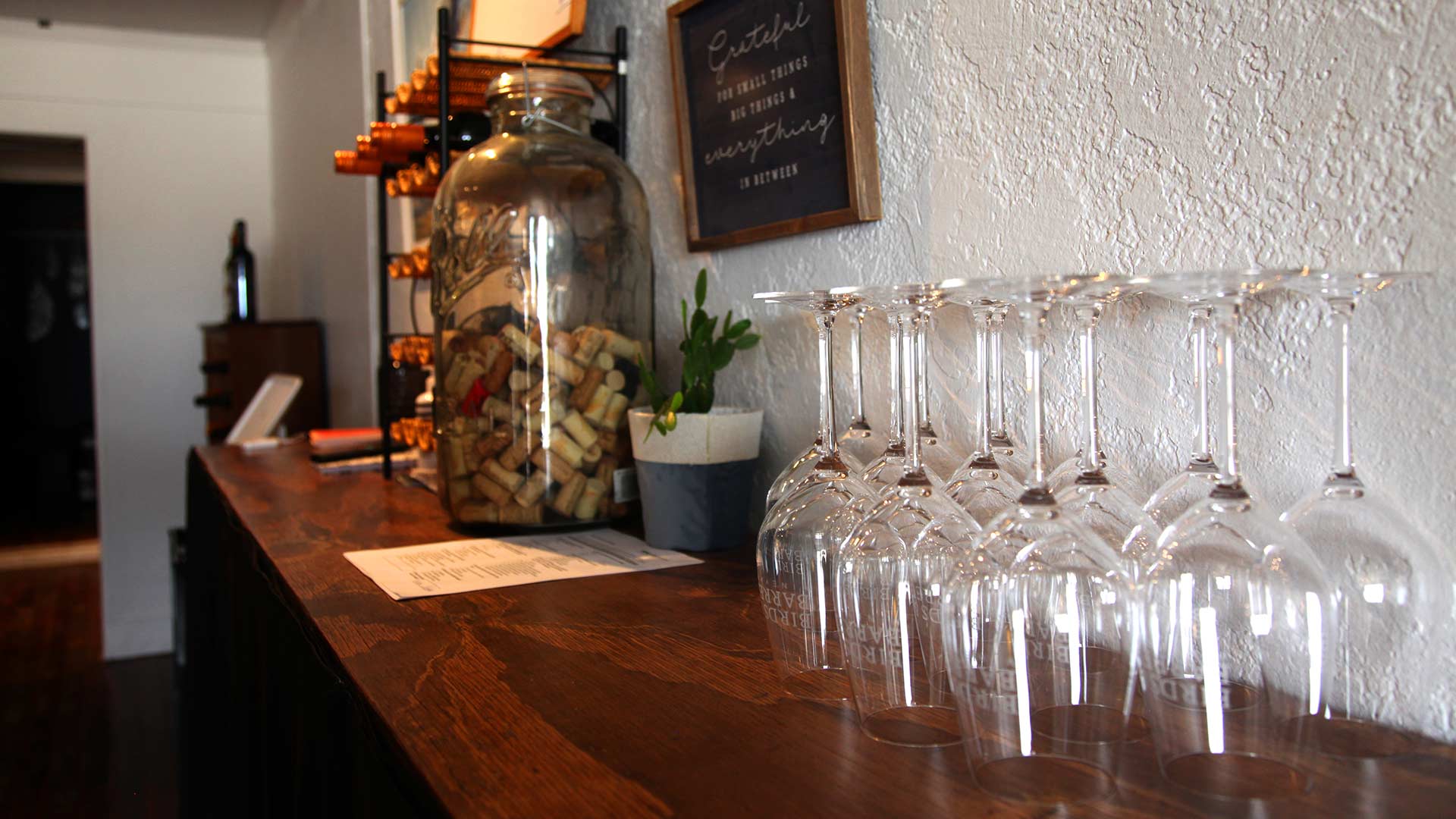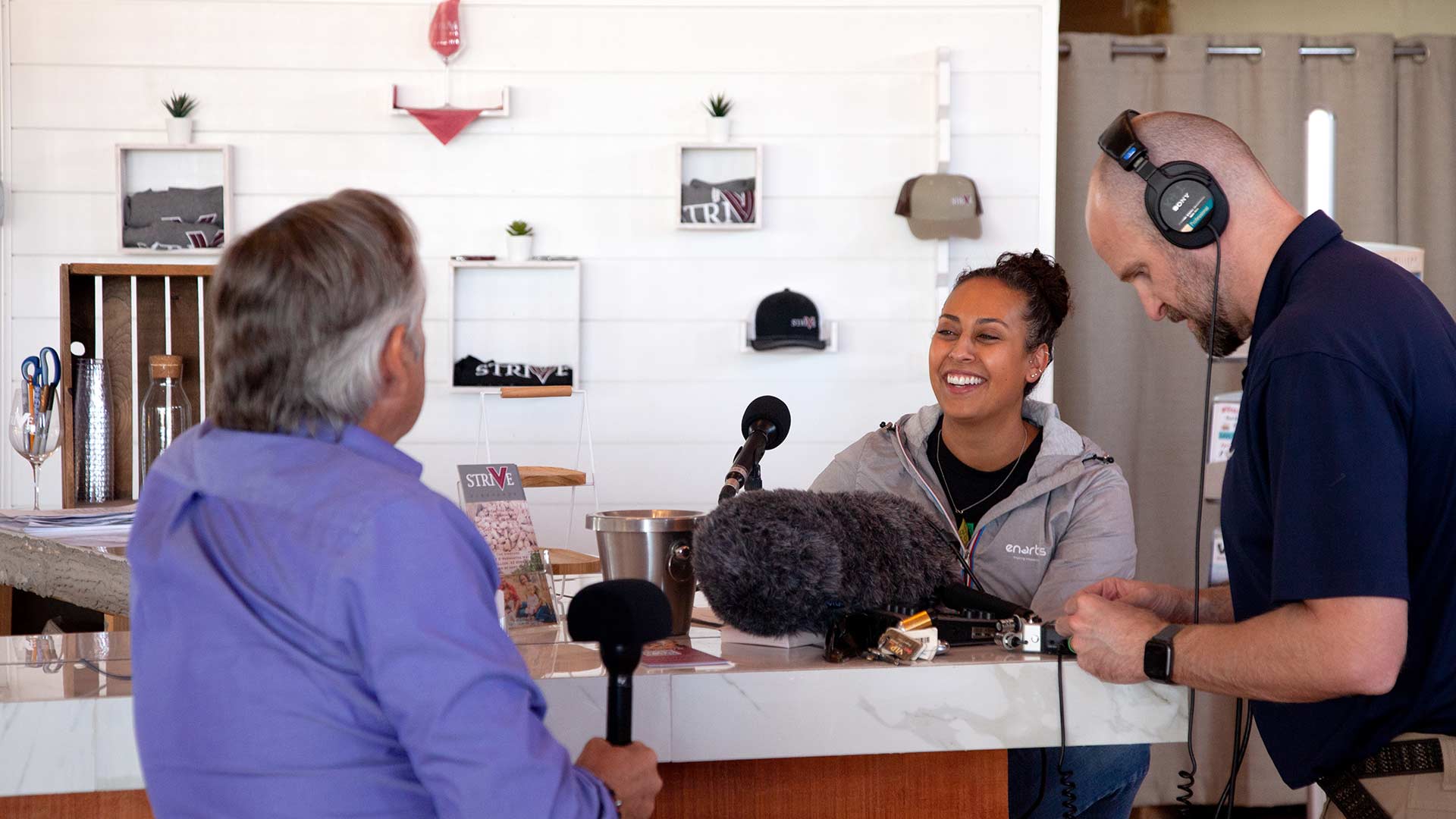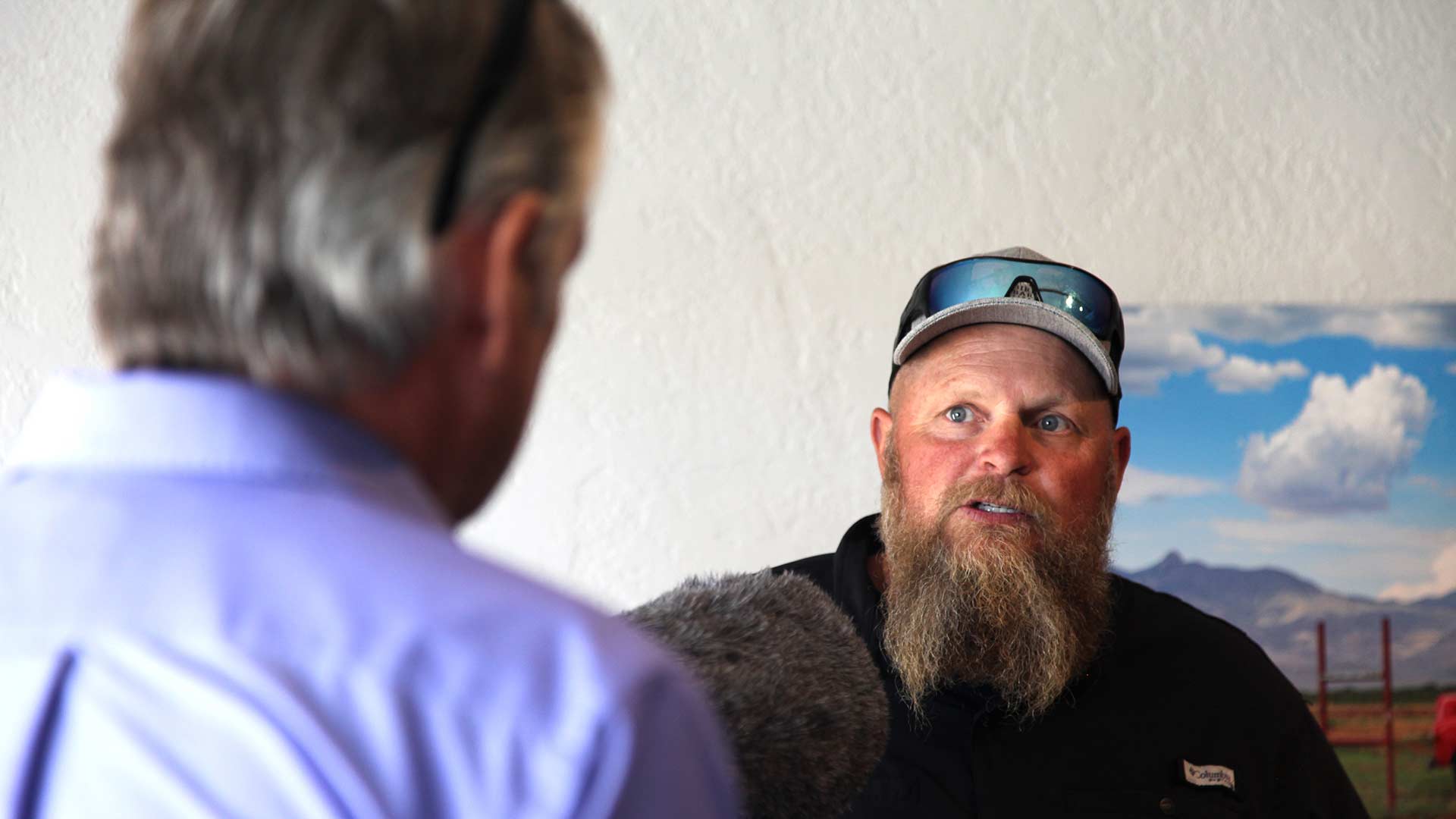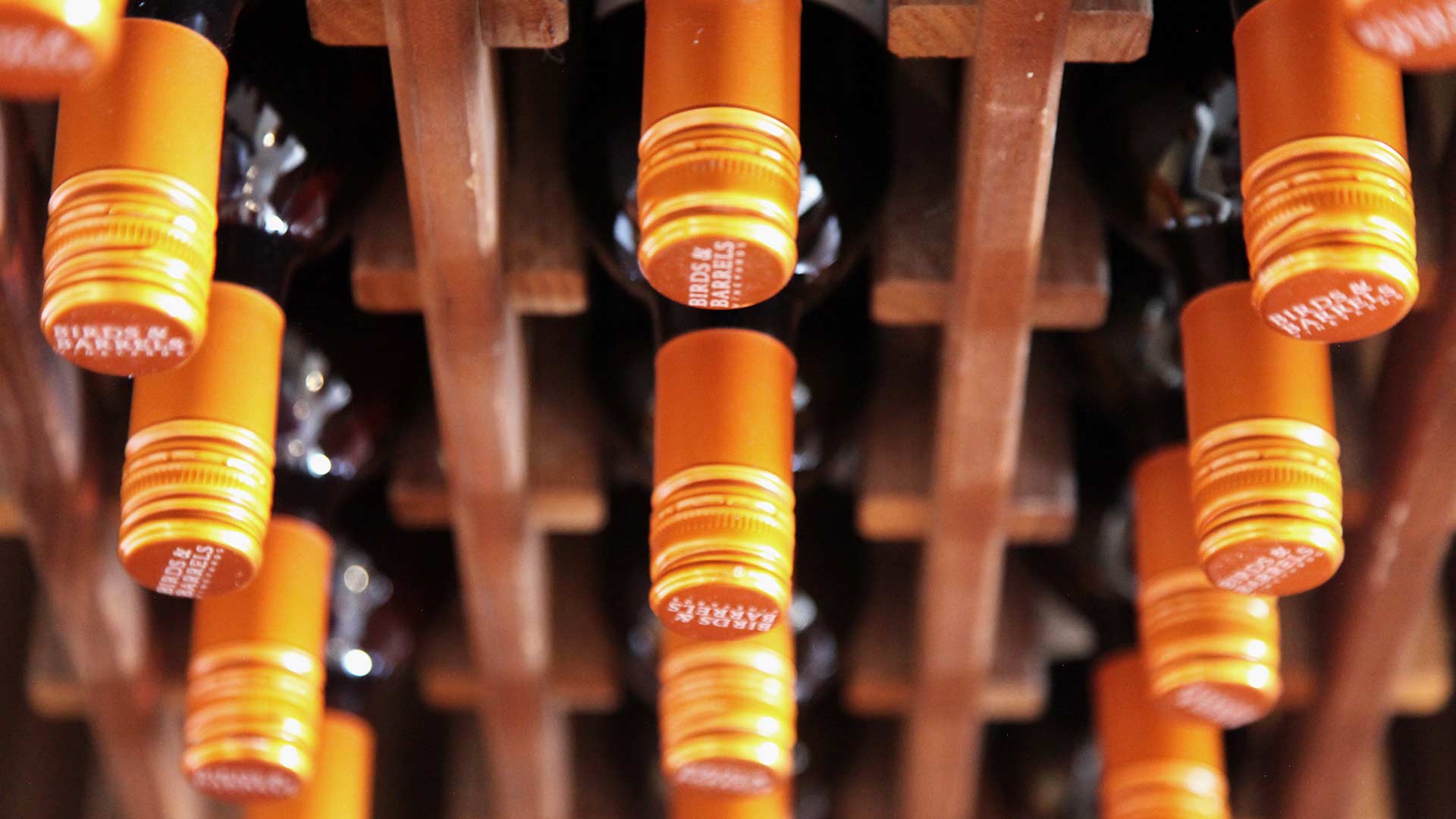 A set of wine glasses stand on a display table behind a tasting bar at Birds and Barrels Vineyards Rail Road tasting room in Willcox on Tuesday, March 14, 2023. The business started shortly after owner Chad Preston finished his military service.
A set of wine glasses stand on a display table behind a tasting bar at Birds and Barrels Vineyards Rail Road tasting room in Willcox on Tuesday, March 14, 2023. The business started shortly after owner Chad Preston finished his military service.
The Buzz for March 24, 2023

Arizona's wine industry is growing. A 2021 report from the Arizona Wine Growers Association found that production nearly tripled from 2012-2019, with business revenues reaching $155.9 million that year.
State lawmakers declared March as Arizona Wine Month, as the industry continues to grow in the state's American Viticulture Areas: Willcox, Sonoita and the Verde Valley, as well as elsewhere around the state as wineries and vineyards establish tasting rooms in larger cities.
The wine industry has already produced one tourism hub in the Verde Valley, and winemakers in the Willcox area are hoping to create another as more tasting rooms open in that city's downtown district.
"We try to work together with hotels, AirBNBs, the restaurants and even community events to make sure we're offering things that will draw people to come down for a day or the weekend," said Desiree Gerth, who founded Strive Vineyards with her husband. "It's really a hidden gem, and we see Willcox as what Napa [Valley, California] was about 50 years ago."
 Desiree Gerth, cofounder of Strive Vineyards, speaks with The Buzz host Christopher Conover as producer Zac Ziegler adjusts audio levels in the Strive Vineyards Tasting Room in Willcox on Tuesday, March 14, 2023. Strive VIneyards is family-owned and operated.
Desiree Gerth, cofounder of Strive Vineyards, speaks with The Buzz host Christopher Conover as producer Zac Ziegler adjusts audio levels in the Strive Vineyards Tasting Room in Willcox on Tuesday, March 14, 2023. Strive VIneyards is family-owned and operated.
Gerth said running a winery can be like running three distinct businesses.
"We've got the farming aspect, which is the vineyard. Super-hard manual labor, nothing glamorous about it. You're out in the fields, it's hot, cold, dirty and fun. Then we go into the winery. Once again, more hard labor working with the grapes. You've got harvest coming in between the end of July and mid-to-late October. With that comes the bottling, blending and labeling. And the third side is the tasting room, the retail side. We've got merchandise, a how-to-make-a-wine club, festivals, people coming in for the tasting room experience and tours in the vineyard."
Gerth and her husband came to Willcox after living in Phoenix for a few years. Before that they came from Wisconsin. She said they fell in love with the wine grapes they were able to get from growers in Willcox, which drew them to relocate again and open Strive Vineyards.
“You should be able to taste the place. That’s how you know that you’re doing it right. It’s sort of like you’ve been given this gift and you’re just trying to turn it into wine and trying not to screw it up. It’s meant to be something beautiful. It starts in the field.”
Down the street from Strive's tasting room on Railroad Avenue is a tasting room for another winemaker that they often partner with, Birds and Barrels Vineyard. The downtown tasting rooms played a role in getting that winery going.
"That's how I got introduced to Willcox wine, my wife and I were exploring down here and I said, 'hey, there's a tasting room. Let's check it out,'" said Chad Preston, who opened Birds and Barrels with his wife in 2015.
 Chad Preston, cofounder of Birds and Barrels Vineyards, speaks with The Buzz host Christopher Conover about what it is like to work with other nearby vineyards at the Birds and Barrels Vineyards' Tasting Room in Willcox on Tuesday, March 14, 2023. Many times Preston will work with Strive Vineyards to make new wine blends.
Chad Preston, cofounder of Birds and Barrels Vineyards, speaks with The Buzz host Christopher Conover about what it is like to work with other nearby vineyards at the Birds and Barrels Vineyards' Tasting Room in Willcox on Tuesday, March 14, 2023. Many times Preston will work with Strive Vineyards to make new wine blends.
The tasting room is on the corner of Railroad Avenue and Maley Street. It also holds a unique place in Cochise County's old west history when it was the Headquarters Saloon. In 1900, the youngest Earp brother, Warren, was shot and killed on the sidewalk.
"It was never in our business model to open up a second tasting room less than 20 miles from each other. We have one at our vineyard in Kansas Settlement where most of the grapes are grown," Preston said. "But the space became available. I looked at it and it's got the best location in all of Willcox, in my opinion."
Like the Gerths, Preston was an amateur winemaker in the Phoenix area who learned about excellent grape-growing conditions in Cochise County and decided to make a major life change. He said the close knit, collaborative nature of winemakers in the area has helped him and others to succeed.
"If somebody needs help, our community is willing to offer it. And the did that to us, Birds and Barrels, when we first came here because we have a unique growing season. Most other viticulture areas in the world have dry growing seasons, dry summers."
Having the monsoon during harvest has led to winemakers experimenting with what varieties of grapes grow well in the region.
While the timing of the water is not perfect, the amount is not an issue. Preston said the amount of water he uses is about equal to what the area gets in rainfall each year.
 The tops of Birds and Barrels wine bottles peak through a display in a tasting room in Willcox on Tuesday, March 14, 2023. The wine selection ranged from dry whites to reds.
The tops of Birds and Barrels wine bottles peak through a display in a tasting room in Willcox on Tuesday, March 14, 2023. The wine selection ranged from dry whites to reds.
Wine grapes in southern Arizona date to the days of Father Kino and Spanish missions, but the history of modern wine growing dates to the last 50 years and work by a University of Arizona professor.
"It started in the late 1970s when UA soil scientist Dr. Gordon Dutt helped some table grape farmers understand some issues they were having in Yuma, and he wanted to study wine grapes," said Michael Pierce, a second-generation winemaker who now heads the only program teaching viticulture and enology in the state, Yavapai College's Southwest Wine Center.
Those early efforts took place in Tucson, where the biggest conclusion was that a higher elevation and cooler temperatures were needed. From their Dr. Dutt moved his experiment to Sonoita, while others tried planting in the Willcox area, marking the start of winemaking in two of the three AVAs. Grape growers began growing in the Verde Valley in the 1990s.
While grape growing centers in southern Arizona, winemaking is often centered in the Verde Valley, according to Pierce, as is wine tourism. That was part of why the Southwest Wine Center was established in that area, though its students come from a variety of places.
"It's not just here in Yavapai County. We've developed a program that caters to students who live in Phoenix, Tucson, or in some cases out of state. We have some students who come from Las Vegas," said Pierce. "And all of our students are adults. When people think of college, they think of 19-21-year-olds. Our average student age is 49."
Pierce said growing has expanded to outside the AVAs in areas such as elsewhere in Yavapai County near Chino Valley and Dewey/Humboldt, as well as near Kingman. All of those areas offer some of what he said was a key factor that Arizona offers, the climate that comes with high elevation.
"When the sun goes down in the desert, it gets cold. It goes from being warm to get your jacket. That helps us. It hardies the grapes, it develops color and phenolics that are in the skins that create the character that we like."
He also said that dry climate and soil that drains water well provides good conditions for the roots of grape wines, which "don't like to have their feet wet."


By submitting your comments, you hereby give AZPM the right to post your comments and potentially use them in any other form of media operated by this institution.